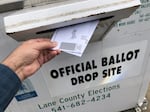
Oregon voters might decide next year whether to adopt a new voting system for federal and statewide officeholders.
Brian Bull / KLCC
Oregon voters could decide next year whether to reshape the way elections for Congress, governor and other positions are decided, under legislation that passed the state House this week.
House Bill 2004 would ask voters whether they want to adopt ranked-choice voting when electing federal officials and statewide officeholders. The ballot referral has been a key priority for Democrats, who believe the new system will cut down negative campaigning and increase voter satisfaction with elections.
“When you do the exit polling, overwhelmingly voters feel they have a better voice in this process,” said House Speaker Dan Rayfield, a Corvallis Democrat whose home county, Benton, is the only place Oregon using ranked-choice voting.
Rather than choosing one candidate, voters in a ranked-choice voting system could choose several, ranking them by preference. If no single candidate received more than 50% of first-preference votes, the candidate with the lowest number of votes would be eliminated and their votes distributed to other candidates. That process would continue until a candidate had amassed a majority of the vote.
The system is already used in Maine and Alaska, along with dozens of cities around the country, according to an analysis by legislative staff. Some other states use the system in a limited capacity for ballots that go to voters who serve in the military or live overseas. And Portland voters last year approved a major change to the city’s governance structure that includes the use of ranked-choice voting as of 2024.
In a floor speech, Rayfield made the case that ranked-choice voting would cut down on campaign mudslinging, as candidates sought to keep in voters’ good graces in order to potentially secure a slot among their preferences. And he suggested that the bill would allow voters to go with candidates they most closely align with – rather than the candidate they believe may have the best chance of being elected – since they might be less worried such a vote would ultimately go to waste.
“I believe in strengthening Democracy, and I believe that’s what House Bill 2004 ultimately does,” he said.
As with many of Democrats’ elections-related bills this year, Republicans are not sold.
“Ranked choice voting ultimately disconnects voters from issues and allows fringe candidates to win elections,” state Rep. Bobby Levy, R-Echo, said before a vote. “We cannot afford to join the handful of states replacing traditional elections with the obtuse deconstruction of political accountability.”
Ranked choice voting, Levy argued, could result in candidates with relatively few first-preference votes, winning office “without a true mandate to govern.”
HB 2004 ultimately passed the House 35-24, almost entirely along party lines. It now heads to the Senate, where it joins dozens of other bills languishing amid a Republican walkout.
Republicans aren’t the only ones who are skeptical. Rayfield said some county elections officials are also leery of the change. One reason the bill would not ask voters to implement ranked-choice voting on legislative races, he said, is that county clerks were worried that additional races using the system would take up too much ballot space.
“Even though they’re not terribly excited about it, in listening and taking advice from them… we believed the correct approach is to compromise and give them something that would make them feel more comfortable,” Rayfield said.
HB 2004 would hand ultimate say over whether to implement ranked-choice voting with the electorate, which would see a measure on their 2024 ballots. If approved, the system would kick in in 2028.
Beyond implementing the new system for federal and statewide officeholders, the measure would explicitly allow local jurisdictions to adopt the format.
